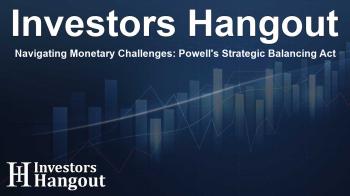Navigating Monetary Challenges: Powell's Strategic Balancing Act

Understanding Jerome Powell's Current Landscape
Jerome Powell, the Chair of the Federal Reserve, is currently operating under a delicate balance as he approaches 2025. His primary goal is to ensure the Fed maintains its independence while also navigating the complexities introduced by the political landscape, particularly with the Trump administration's policies.
The Challenge of Inflation Management
One of Powell’s main challenges is managing monetary policy without seeming to undermine potential inflationary pressures that may stem from new policies. The need to keep inflation in check while adapting to changing economic directives is paramount.
Recent Trends in Interest Rates
In the months leading up to now, Powell has taken a cautious approach. Following Trump’s election victory, he reiterated that the Fed won’t speculate on how potential changes in administration policies might affect interest rates. Despite this, the Fed has recently revised its projections, hinting at an understanding that policy changes could influence their actions.
Shifts in Economic Projections
Recently, the Federal Reserve reduced rates by a quarter point, marking a complete percentage point decline since September. However, the accompanying economic forecasts suggest a more restrained stance on future easing, with officials indicating only two rate cuts may occur next year instead of four.
Impacts of Trump's Economic Proposals
Trump’s proposed economic changes, particularly regarding tariffs and labor policies, are crucial factors contributing to the Fed's cautious outlook. Increasing tariffs could lead to higher prices, while immigration policies that tighten labor supply may push wages upward. Powell, however, has sought to separate the potential inflation impacts from direct influences of the Trump administration, attributing the Fed’s cautious position more to prevailing inflation data than direct political pressure.
Maintaining an Apolitical Fed
In light of these pressures, Powell has advised Fed officials to be prudent with their public statements to maintain the perception of the Fed as an apolitical entity focused solely on data-driven policies. This approach is essential in safeguarding the credibility of the institution, especially given the volatility often associated with election years.
Learning from the Past
The past experiences during Trump’s first term, particularly the impacts of trade wars, provide critical lessons for Powell as he forges ahead. Unlike the low-inflation climate of 2018, the current environment features elevated inflation levels that are being felt by consumers and businesses alike.
Assessing Future Economic Policy
Powell highlights that the Fed is diligently evaluating possible pathways and the multifaceted ways tariffs can affect the economy. This scrutinization aims to prepare the Fed for thoughtful policy responses as actual legislative measures become clearer.
The Role of Business and Consumer Behavior
Economic analysts suggest that an increase in deregulation and energy production could potentially mitigate inflationary pressures. Treasury officials have posed that if one product’s price increases, without additional income, consumers might compensate by spending less on other items, thereby controlling overall inflation. However, this view is not universally accepted among experts.
Anticipating Economic Reactions
Experts anticipate that the Fed will remain cautious, particularly if the momentum of these economic improvements reverses. The historical context is vital; the Fed is acting from a position of having experienced several years of inflation significantly above target, which differs vastly from previous low-inflation periods.
Uncertainty in Price Adjustments
Considering the circumstances of full employment, rising costs are more likely to be transferred to consumers. Nevertheless, there is significant uncertainty regarding how quickly businesses will alter their pricing strategies; slow adjustments could lead to persistent inflation perceptions among consumers.
Frequently Asked Questions
What is Powell's main challenge as he approaches 2025?
Powell's primary challenge is managing monetary policy effectively while navigating potential inflation arising from new government policies.
How are recent interest rate trends affecting the economy?
Recently, the Fed cut interest rates by a quarter point, but projections indicate a more careful outlook with fewer expected cuts next year.
What economic factors are influencing Powell's decisions?
Tariffs, labor policies, and inflation data prominently influence Powell's monetary policy decisions while maintaining the independence of the Fed.
How does Trump's policy agenda impact inflation?
Trump's proposals regarding tariffs and labor can potentially drive prices higher, impacting inflation rates and Fed responses.
Why is it crucial for the Fed to maintain an apolitical stance?
An apolitical stance helps the Fed preserve its credibility, ensuring decisions are based on data rather than political influences.
About The Author
Contact Caleb Price privately here. Or send an email with ATTN: Caleb Price as the subject to contact@investorshangout.com.
About Investors Hangout
Investors Hangout is a leading online stock forum for financial discussion and learning, offering a wide range of free tools and resources. It draws in traders of all levels, who exchange market knowledge, investigate trading tactics, and keep an eye on industry developments in real time. Featuring financial articles, stock message boards, quotes, charts, company profiles, and live news updates. Through cooperative learning and a wealth of informational resources, it helps users from novices creating their first portfolios to experts honing their techniques. Join Investors Hangout today: https://investorshangout.com/
The content of this article is based on factual, publicly available information and does not represent legal, financial, or investment advice. Investors Hangout does not offer financial advice, and the author is not a licensed financial advisor. Consult a qualified advisor before making any financial or investment decisions based on this article. This article should not be considered advice to purchase, sell, or hold any securities or other investments. If any of the material provided here is inaccurate, please contact us for corrections.

